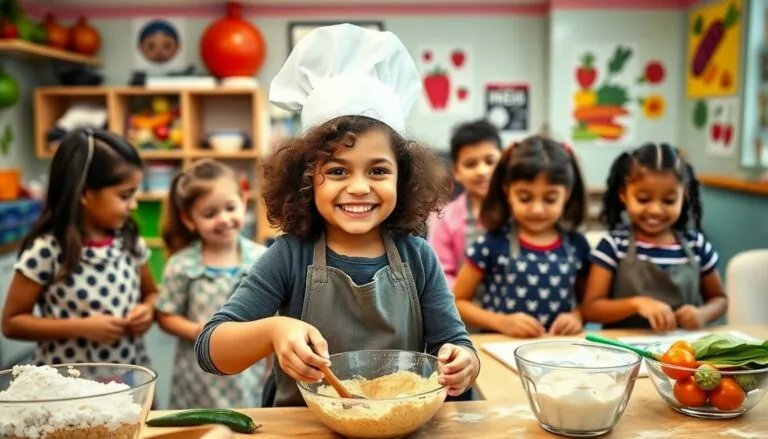Looking for a way to transform those picky eaters into mini master chefs? Summer cooking camps for kids offer the perfect blend of fun culinary adventures and valuable life skills. These interactive programs teach children everything from kitchen safety to creative recipe development while keeping their hands busy and their minds engaged.
Kids who attend cooking camps don’t just learn to follow recipes – they discover the science behind baking develop math skills through measuring and gain confidence in their abilities. With professional instructors guiding them through age-appropriate cooking techniques these young chefs-in-training create delicious dishes while making new friends and memories. Best of all they’ll bring their newfound enthusiasm for cooking home to share with the whole family.
Table of Contents
ToggleBenefits of Cooking Camps for Young Chefs
Cooking camps provide transformative experiences for children ages 8-14 through hands-on culinary education. These specialized programs combine practical kitchen skills with personal development opportunities in structured learning environments.
Life Skills Development
Summer cooking camps equip young chefs with essential life competencies beyond basic food preparation. Students master kitchen organization techniques like mise en place preparation systems while developing time management abilities through structured recipe completion. Kids learn critical food safety protocols including proper hand washing procedures temperature monitoring methods cross-contamination prevention. They practice real-world math applications by scaling recipes calculating measurements converting units of measure. Communication teamwork flourish as participants collaborate on group cooking projects coordinate kitchen tasks share workspace resources.
Culinary Confidence Building
Young chefs gain measurable confidence through progressive skill mastery during summer cooking programs. Kids start with basic knife skills like dicing vegetables advance to complex techniques such as sauce making pastry preparation. Students experience pride ownership when serving completed dishes to fellow campers instructors family members. Their enhanced capabilities translate into increased independence in home kitchens where they recreate camp recipes lead family cooking projects. Many participants transition from hesitant observers to enthusiastic kitchen leaders demonstrating new techniques teaching siblings family members about food preparation methods.
What to Expect at Kids’ Cooking Summer Camps
Cooking summer camps offer structured culinary education programs designed specifically for young chefs. These immersive experiences combine hands-on cooking instruction with age-appropriate activities in professional kitchen environments.
Daily Activities and Schedules
Each camp day runs 6-8 hours featuring multiple cooking sessions interspersed with engaging activities. Morning sessions focus on basic culinary skills like measuring ingredients preparing fresh produce. Midday activities include recipe planning team challenges recipe development workshops. Afternoon sessions concentrate on cooking full dishes baking projects plating techniques. Campers participate in 3-4 hands-on cooking activities daily including:
- Creating breakfast items like omelets pancakes smoothie bowls
- Preparing lunch dishes such as homemade pasta fresh salads sandwiches
- Baking desserts including cookies cakes bread
- Learning international cuisines through themed cooking days
- Participating in culinary games cooking competitions taste tests
Safety Protocols and Supervision
Professional instructors maintain a 1:8 ratio ensuring individualized attention proper safety practices. The kitchen environment includes:
- Height-appropriate workstations with non-slip mats
- Child-sized cooking tools equipment suited for small hands
- Clear safety zones around hot cooking surfaces ovens
- Readily available first aid supplies certified staff
- Regular handwashing stations sanitizing protocols
- Proper food handling storage temperature monitoring
- Allergen awareness cross-contamination prevention measures
Each instructor holds food safety certification CPR training creating a secure learning environment. Staff members monitor kitchen activities ensure proper technique usage maintain cleanliness standards throughout sessions.
Choosing the Right Cooking Camp Program
Selecting an appropriate cooking camp enhances a child’s culinary education experience. Parents evaluate specific program features to match their child’s interests abilities.
Age-Appropriate Options
Cooking camps segment activities based on developmental stages ensuring optimal learning experiences. Programs for ages 5-7 focus on basic kitchen safety fundamentals including proper hand washing measuring ingredients identifying kitchen tools. Camps for ages 8-11 introduce knife skills recipe reading food science experiments group cooking projects. Advanced programs for ages 12-14 cover complex cooking techniques international cuisines menu planning budgeting skills. Each age group receives specialized equipment sized for small hands proper workstation heights appropriate instructor supervision ratios.
Specialized Dietary Accommodations
Cooking camps incorporate comprehensive dietary options to serve diverse nutritional needs. Programs offer dedicated allergen-free cooking stations separate preparation areas gluten-free dairy-free nut-free alternatives. Vegetarian vegan camps teach plant-based cooking techniques meat alternatives protein-rich recipes. Kosher halal programs maintain strict religious food preparation guidelines certified ingredients appropriate kitchen equipment. Staff members receive specialized training in cross-contamination prevention allergen management dietary restriction protocols. Medical professionals remain on-call during camp sessions to address potential dietary-related concerns.
| Age Group | Key Activities | Supervision Ratio |
|---|---|---|
| 5-7 years | Basic skills safety | 1:6 |
| 8-11 years | Knife skills recipes | 1:8 |
| 12-14 years | Advanced techniques | 1:10 |
Essential Skills Taught at Cooking Camps
Summer cooking camps equip children with fundamental culinary abilities through structured, hands-on learning experiences. Professional instructors guide young chefs through progressive skill development using age-appropriate teaching methods.
Kitchen Safety and Hygiene
Food safety protocols form the foundation of cooking camp education. Children learn proper hand washing techniques with antibacterial soap for 20 seconds before handling food. Young chefs master safe knife handling positions with age-appropriate cutlery. Instructors demonstrate correct food storage temperatures: 40°F for refrigerated items and 0°F for frozen foods. Students practice proper cleaning methods for surfaces using separate cutting boards for raw meats and produce. The curriculum covers cross-contamination prevention through color-coded equipment and designated preparation zones.
Basic Cooking Techniques
Students develop essential cooking methods through daily hands-on practice. Children master measuring techniques using standard and metric tools for both dry and liquid ingredients. Knife skills progress from basic vegetable cutting to advanced dicing and julienne techniques. Students learn temperature control across different cooking methods:
| Cooking Method | Temperature Range |
|---|---|
| Sautéing | 350-375°F |
| Baking | 325-425°F |
| Roasting | 375-400°F |
| Simmering | 185-205°F |
Instructors teach proper equipment handling including mixing methods folding whisking blending. Students practice heat management across stovetop burners ovens microwaves.
Popular Cooking Camp Themes and Specialties
Summer cooking camps offer diverse culinary programs tailored to children’s interests. Each themed program creates unique learning opportunities through specialized instruction methods focused on specific cooking styles.
International Cuisine Programs
International cuisine camps transport young chefs across global culinary traditions in week-long cultural immersions. Students explore Italian pasta-making techniques on Mondays practicing handmade ravioli gnocchi. Tuesdays focus on Asian cuisines teaching sushi rolling dumpling folding stir-frying methods. Mexican cooking sessions introduce authentic taco salsa guacamole preparation. French culinary days cover classic techniques like sauce-making croissant folding. Mediterranean cooking rounds out the week with Greek spanakopita hummus falafel creation. Children learn cultural context authentic ingredients traditional cooking methods for each regional cuisine explored.
Baking and Pastry Camps
Baking camps engage children in the precise art of pastry making through structured hands-on instruction. Students master measuring techniques temperature control leavening science during morning sessions. Practical applications include bread baking cake decorating cookie design pastry shaping. Advanced sessions cover chocolate tempering sugar work fondant modeling piping techniques. Participants create signature items like custom birthday cakes decorated sugar cookies artisan bread loaves. Science elements integrate pH testing gluten development ingredient reactions into daily lessons.
Preparing Your Child for Cooking Camp
Preparing children for cooking camp creates a foundation for successful culinary learning experiences. Proper preparation ensures young chefs arrive ready to participate fully in all camp activities.
Required Equipment and Supplies
Cooking camps require specific items for each participant’s safety and success. Essential supplies include closed-toe non-slip shoes, hair restraints, clean aprons, and a reusable water bottle. Many camps provide specialized cooking tools, though students bring their own chef’s notebook for recipe documentation. Parents pack extra clothes in case of spills, plus hand sanitizer and personal hygiene items. Most programs supply food storage containers for taking completed dishes home. A clearly labeled lunch box stores any personal snacks or medications separate from cooking ingredients.
Dietary Restrictions and Allergies
Parents communicate dietary restrictions during camp registration to ensure safe meal preparation. Medical forms document food allergies, sensitivities, religious dietary requirements or lifestyle choices like vegetarian or vegan diets. Camp staff creates designated preparation areas for students with severe allergies to ingredients such as nuts, dairy or gluten. The kitchen maintains separate utensils, cutting boards and storage spaces for allergen-free cooking. Staff members receive training in cross-contamination prevention protocols and emergency response procedures for allergic reactions. Instructors review ingredient lists with affected students before each cooking activity.
Conclusion
Summer cooking camps offer children more than just culinary skills – they’re gateways to personal growth and lifelong passions. These programs create safe spaces where kids discover the joy of cooking while building confidence teamwork and creativity. The structured environment professional guidance and age-appropriate curriculum ensure that young chefs develop essential life skills they’ll carry far beyond the kitchen.
Parents who invest in cooking camps for their children provide them with an enriching summer experience that combines education entertainment and practical life skills. From basic techniques to cultural exploration these programs lay the foundation for healthy relationships with food and cooking that will serve children throughout their lives.







